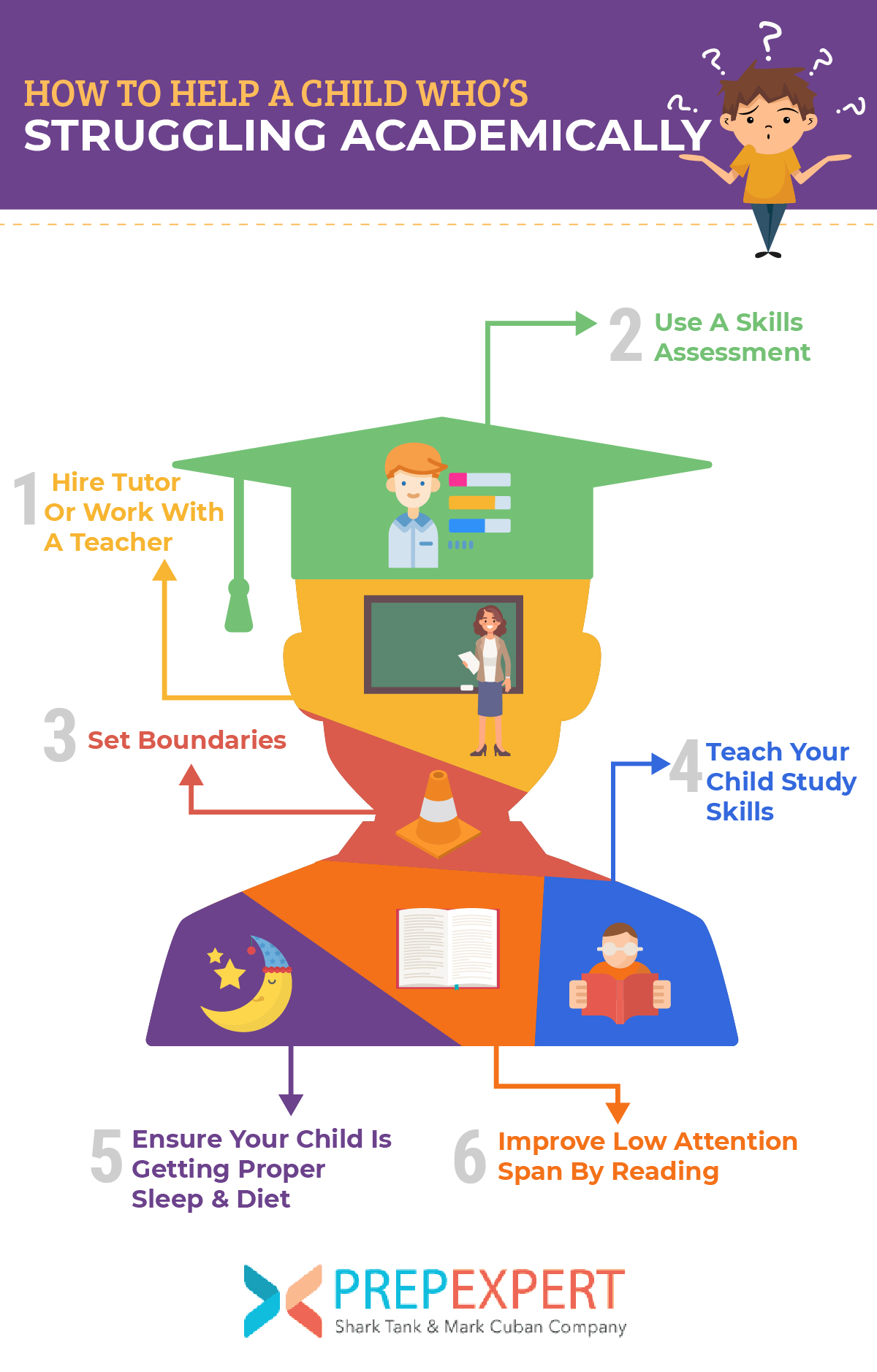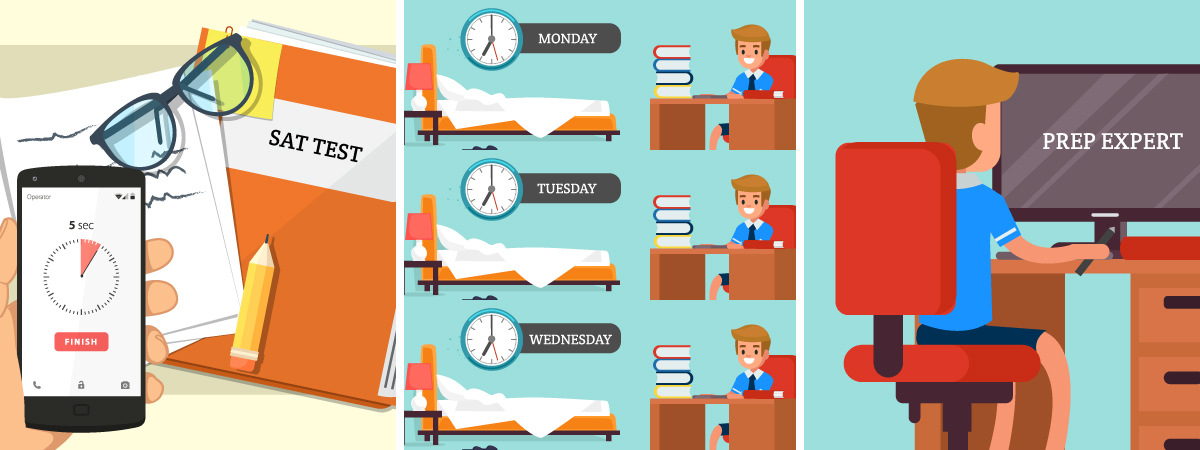How To Help A Child Struggling Academically
Parents want their children to soar academically. But, sometimes children struggle in school, causing self-doubt for the parents. It doesn’t have to be like this. Parents can equip themselves with tools to help their struggling child.
Students often perform poorly in school because of various factors. Below you will learn how to help your child overcome these academic struggles.
A Prep Expert® course in the ACT or SAT prep course can boost your child’s motivation and study skills as he or she envisions the college he or she wants to attend.


Hire Tutor Or Work With A Teacher
Some students struggle in school because they are missing an academic skill that is foundational to a particular class.
For example, because of the sequential nature of math courses, if students don’t pick up a particular skill one class, that skills-gap will affect them in the next class.
Sometimes a specific missing skill will come back to haunt a student later. That student may somehow miss out on learning the complexities of triangles in geometry.
The student may do well in math for quite some time, but then suddenly struggle to understand the unit circle because triangles are foundational to it.
The student may fall behind, earn low scores on tests, and all of sudden one day may not be able to apply a teacher’s lesson when in the past the student had no problems learning in class.
Good news! Tried and true remedies exist for such targeted skill gaps. One is to get a tutor for the subject. Often, the one-on-one attention a tutor provides will shed light on any skill gaps a student may have.
Sometimes this can be a quick fix, especially if a student is up to par on most other skills in that subject. Another remedy is to meet with the teacher in that subject to inquire about skills gaps.
Many teachers are overloaded, so prepare beforehand by communicating with the teacher about skill gaps. This way, you give the teacher time to:
- Prepare by pulling up the grades
- Find copies of past tests
- Talk to a previous teacher in the same subject
Many teachers will go out of their way to help you out when you work with them, but conversely may not be much help if you catch them flat-footed.

Use A Skills Assessment
A general skills assessment in math, reading, or writing can reveal a broad set of skills that a student is missing. Work with a school or tutor to address the revealed skill gaps.
Not all gaps are confined to one or two skills. Some students struggle more broadly with reading, writing, or math skills. This is applicable when a student has been struggling over a long period in several related classes.
While it’s true that reading is now central in all subject because of Common Core, a student who struggles with reading still may not struggle with math. These broad skill deficiencies tend to manifest in elementary and middle school years.
If a student has made it to high school without struggling academically, he or she probably has his or her basic reading, writing, and math skills covered.
However, for those students who are suspected of having these larger skill gaps, a good solution is to have them take some kind of criterion-referenced skills assessment.
These tests will cover the entire spectrum of skills in a particular domain – such as math, reading or writing – and reveal all the skill gaps a student has.
The next step would be to work with the student’s school, or with an outside tutor, to help the student strengthen the exact skills he or she is weak in.

Set Boundaries
Set boundaries for students who have poor priorities. Set clear limits for video games, television, and smartphones.
To put it frankly, some students are lazy and undisciplined and this is the source of their academic struggles. Academically, the jargon for this problem is “low motivation” and there are two good solutions for it: setting priorities, and teaching study skills.
[leadmagnet_five]
Students need to prioritize studying to overcome academic struggles. While this would never happen with your child, there are students out there who spend in excess of five hours per day playing video games.
Time playing video games can be such a dead weight that little time is left for studying. A recent study from Denison University showed that video game use causes lower scores in reading and writing tests, as well as more negative teacher reports.
Parents can help these children by setting boundaries, such as restricting video-game-time to a more reasonable quantity. Of course, excessive video game use is only one example of poor priorities. Others distractions include television, mindless internet surfing, social media, and smartphones.
For an academically struggling student, all such activities should have clear boundaries placed around them. However, parents should be cautioned not to think of sports as a distraction.
Some types of exercise have been linked to improved cognitive function and growth of the brain’s gray matter, which has neurons responsible for processing information.

Teach Your Child Study Skills
Learning study skills is a concrete way to tackle low motivation.
A student who struggles academically should learn to learn organization, note-taking, and planning skills. Students with low motivation may need to be taught study skills. Some students slide by with decent, or even good, grades without ever learning study skills.
Such a student finally hits a course, probably in high school, that is beyond his or her natural skills and struggles for the first time. In reality, this struggle is the manifestation of lurking problem – lack of study skills – that the student has been masking because of an IQ on the higher end of the bell curve.
When these students are taught specific study skills, they finally have the tools to overcome their low motivation. It can be difficult for a student to tackle a problem as general as study skills.
It’s much easier to take a concrete step, such as organizing separate binders for each subject, filling in a daily planner, or taking notes.
Parents can find study skills courses online, or perhaps get help from a school guidance counselor. Some schools even have academic tracks that focus on teaching study skills. Students often enjoy applying study skills because it boosts their self-confidence.

Ensure Your Child Is Getting Proper Sleep & Diet
Lack of sleep and a poor diet contribute to academic struggles. Make sure your child gets 9 to 9 ½ hours of sleep a night and has a proper diet.
Some students struggle academically because of lack of sleep or a poor diet. Believe it or not, studies have shown that students who don’t get enough sleep get lower grades, fall asleep in class, and have issues with tardiness and attendance.
While all of this may seem like common sense – after all it’s hard to learn when you are tired – most parents don’t know that teenagers should get 9 to 9 ½ hours of sleep a night.
It is also important that the student goes to bed and wakes up at the same time every night. In general, good sleep can curb academic struggles.
[leadmagnet_two]
Also, a good diet has been linked to positive academic performance. A recent study from the University of Alberta, found that students who ate the proper of amounts of fruit, vegetables, protein, and fiber, while avoiding caloric intake from saturated fat, did better on reading tests.
Breakfast is, as the adage goes, the most important meal of the day. Students need the energy to maintain focus during their first four to five hours of the day, before lunch. Hungry students have a hard time paying attention and doing well in class.

Improve Low Attention Span By Reading
A student can improve his or her attention span by incrementally reading for longer periods of time.
Many students struggle because of a limited attention span. While medical remedies exist for this problem, such a solution is beyond the scope of this article and should be worked out with a medical professional.
Still, it is important to recognize that attention span can properly be categorized as a brain-based problem, not merely a problem with motivation.
A student with a low attention span may experience something like a headache, or lightheadedness, after reading quietly for only five minutes. The student may have a hard time learning anything beyond that point.
The good news is that the brain has plasticity, meaning that it changes in response to stimuli. If a student with a five-minute attention span forces himself or herself to read for incrementally longer periods of time, the brain will adjust, and he or she won’t experience a headache anymore after five minutes.
The student has to place some faith in the process though because he or she has to push past the uncomfortable feeling. Results should come after a few weeks.
Within a few months, it is expected that such a student may be able to read smoothly for 30 to 45 minutes without taking a break. Such an increase in attention span will have a positive influence on academic grades.
Parents have tools at their disposal when their children start to perform poorly in school. Parents and their kids will be rewarded when they address skill gaps, wrong priorities, lack of study skills, improper sleep or diet, and short attention span.
For more test strategy, college admissions, and scholarship application tips sign up for our FREE class happening right now!
How To Help A Child Struggling Academically FAQ
What are some common reasons students struggle with school?
Students often perform poorly in school because of skill gaps, wrong priorities, lack of study skills, improper sleep or diet, and short attention span.
How can I get help with classes I have problems with?
One common method is to get a tutor for the subject. Often, the one-on-one attention a tutor provides will shed light on any skill gaps a student may have.
How much sleep should a student get at night to help with their attention span?
Make sure your child gets 9 to 9 ½ hours of sleep a night and has a proper diet.
What should I do for a low attention span?
The good news is that the brain has plasticity, meaning that it changes in response to stimuli. If a student with a five-minute attention span forces himself or herself to read for incrementally longer periods of time, the brain will adjust.
Written by Dr. Shaan Patel MD MBA
Prep Expert Founder & CEO
Shark Tank Winner, Perfect SAT Scorer, Dermatologist, & #1 Bestselling AuthorMore from Dr. Shaan Patel MD MBA

The Student Loan Rules Just Changed—And Most Families Aren’t Ready
By Dr. Shaan Patel, CEO & Founder of Prep Expert® Student loans have always been complicated. But starting in…

Confidence Is the Hidden Score Booster No One Talks About
Most students think SAT® and ACT® success comes down to knowing more math formulas or grammar rules. That’s only half…

What Kind of SAT Score Gives You a Good Chance at a Scholarship in 2026?
As more colleges remain test optional, students often assume standardized test scores no longer matter for scholarships– but that’s a…